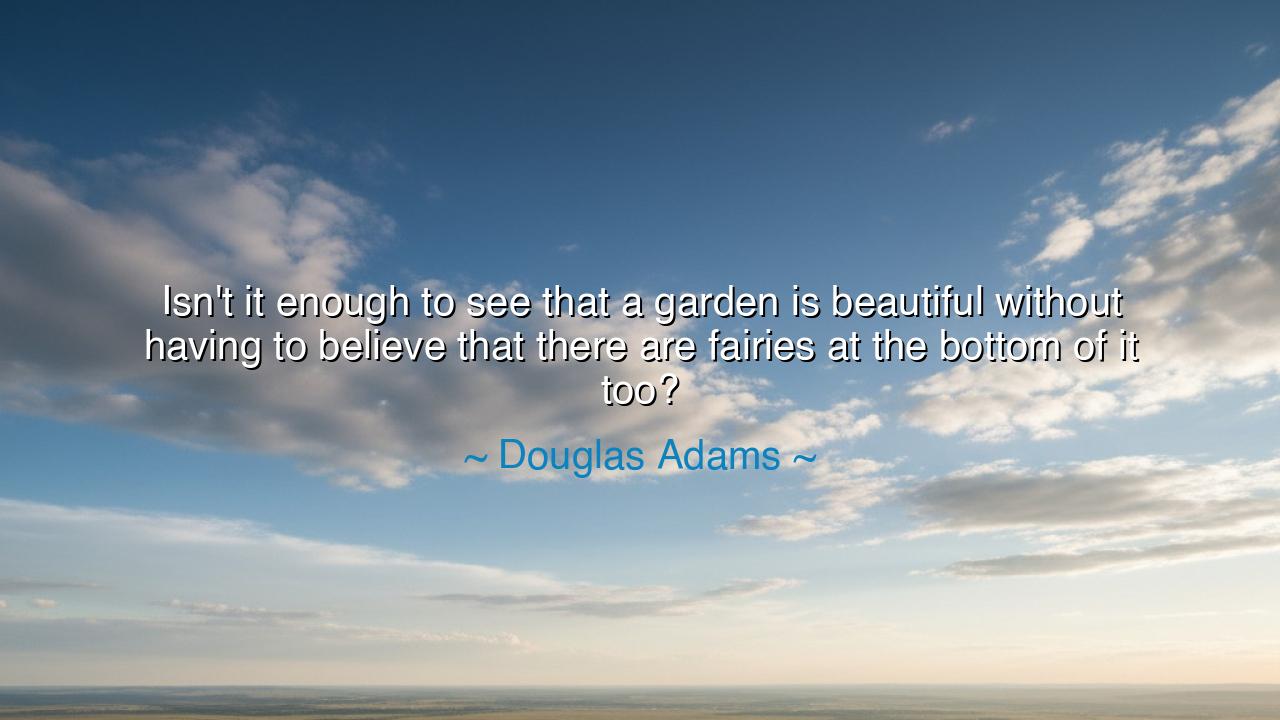
Isn't it enough to see that a garden is beautiful without having
Isn't it enough to see that a garden is beautiful without having to believe that there are fairies at the bottom of it too?






In the grand tapestry of life, there are moments when the heart is touched by something so simple, so pure, that it transcends the need for explanation or deeper meaning. It is as though the soul itself recognizes the beauty, and there is no need for further embellishment, no need to complicate what is already perfect. In these moments, we are reminded of the words of Douglas Adams, who once asked, "Isn't it enough to see that a garden is beautiful without having to believe that there are fairies at the bottom of it too?" These words, though light in their tone, carry with them a wisdom that speaks to the human need to complicate and explain what is already wonderful in its simplicity.
The garden, in its purest form, is a reflection of nature’s perfect harmony—a place where the flowers bloom, the trees stand tall, and the air is rich with life. And yet, how often do we feel the urge to adorn this natural beauty with explanations, with beliefs, with myths? How often do we seek to explain the unexplainable, to turn something simple and beautiful into a riddle, to ask what lies beyond what is right before our eyes? The garden itself, in its existence, is enough. Beauty needs no justification. The flowers do not bloom because we believe in their magic—they bloom because they are alive, and their life is an expression of the mystery of existence itself.
In the ancient teachings, it was said that the simplest truths were the greatest. The Tao, in its wisdom, teaches us that the way is not always found through complexity or the accumulation of knowledge, but through simplicity, through understanding that the world is as it is. There is power in embracing the present moment, in accepting that there are things in this world that do not need to be dissected or explained in order to be appreciated. The garden, then, is a lesson in this philosophy—its beauty lies not in the belief that there are fairies beneath the soil, but in the pure joy of its existence, in the way it brings peace to the mind and nourishment to the spirit.
Consider, too, the wise Zen masters of ancient times, who taught their disciples to sit in silence, to witness the unfolding of life without the need for commentary or interpretation. One famous Zen story tells of a master who, when asked to explain the meaning of a flower in bloom, simply smiled and pointed. There was no need for words. The beauty of the flower was its own answer. Similarly, Douglas Adams invites us to see that the beauty of the garden, in its raw and unadorned state, is enough. We do not need to believe in fairy tales to experience its magic. The garden, in its truth, is a miracle without needing to be mystified.
There is also a great lesson here in the way we view life itself. How often do we complicate matters, seeking meaning in places where there is none? How often do we create stories and myths around our own existence, trying to find reasons for things that simply are? Life, like the garden, is beautiful in its simplicity, and there is profound wisdom in letting go of the need for constant explanation. A wise person does not seek to explain every event or encounter but simply lives with an open heart, appreciating what is. True understanding comes not from knowing all the answers, but from being present in the experience.
Let us reflect on the story of Leonardo da Vinci, who spent countless hours studying nature, not to unravel it, but to marvel at it. Da Vinci’s genius lay not in finding the explanations for why the sky is blue or why a flower opens at dawn. His genius was in appreciating the mystery and beauty of the world without the need to dissect it. He marveled at the patterns of the natural world as a child marvels at a butterfly. In doing so, he taught the world that wonder is found not in knowledge alone, but in the experience of the world itself.
And so, let this wisdom guide you in your own life. Not everything needs to be explained, nor does every wonder require a myth. Pause, take a moment to look at the garden of your life—its beauty, its simplicity. Do not burden it with the need to understand the unseen or the mystical. Revel in its existence as it is. Let it be enough. When you find yourself chasing after reasons, explanations, or elaborate stories, remind yourself of the garden—simple, pure, and profoundly beautiful without the need for fairies at its bottom. Just as the garden exists without explanation, so too can you exist in the fullness of life without the need to complicate it. Let the present moment be enough.






AAdministratorAdministrator
Welcome, honored guests. Please leave a comment, we will respond soon